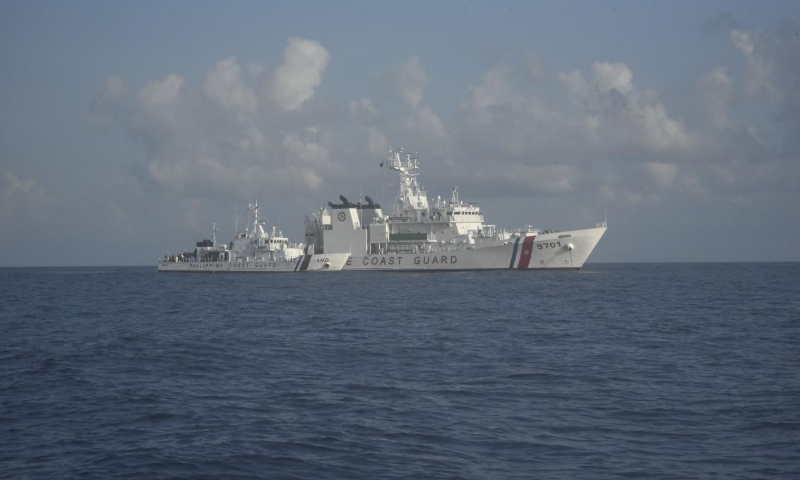
The photo taken on May 3, 2024 shows the Philippine ships 4402 and 9701 are transferring supplies in the waters of China's Xianbin Jiao. Photo: China Coast Guard
After the infringement activities related to Huangyan Dao, also known as Huangyan Island and Ren'ai Jiao (Ren'ai Reef), were severely countered by the China Coast Guard, the Philippines has attempted to assert its presence at China's Xianbin Jiao.
According to previous reports from the Philippine media, in April this year, the Philippine Coast Guard began dispatching ships to anchor in the waters of Xianbin Jiao and continuously sent coast guard vessels to deliver supplies to the illegally stationed Philippine ships there.
Recent on-site images obtained by the Global Times showed that in addition to frequently transporting fresh water, fuel, and food, the Philippines has also attempted to deliver building materials, suspected to be cement, to the illegally stationed Philippine Coast Guard ships at Xianbin Jiao. This series of actions by the Philippines warrants high vigilance.
Some experts told the Global Times that the Philippines aims to turn Xianbin Jiao into a maritime "base" for illegally supplying Ren'ai Jiao and a "foothold" for conducting infringement activities in the South China Sea. However, this move will only increase China's law enforcement presence at Xianbin Jiao.
The Philippine ship asserting its presence at Xianbin Jiao is the Philippine Coast Guard's largest vessel, the "BRP Teresa Magbanua" (hull number MRRV-9701), the Global Times learned.
This ship was built by Japan's Mitsubishi Shipbuilding based on the Japan Coast Guard's Kunigami-class patrol vessel. Japanese media reports indicate that the ship is approximately 96 meters long, with a gross tonnage of nearly 2,300 tons, and can carry up to 67 crew members, with an endurance of up to 15 days.
It is also one of the most advanced ships in the Philippine Coast Guard, touted as a "force multiplier" capable of supporting Philippine Navy operations. The Philippine Coast Guard has defined the ship's role as a "quick response platform" capable of performing personnel transport and logistical supply missions at sea.
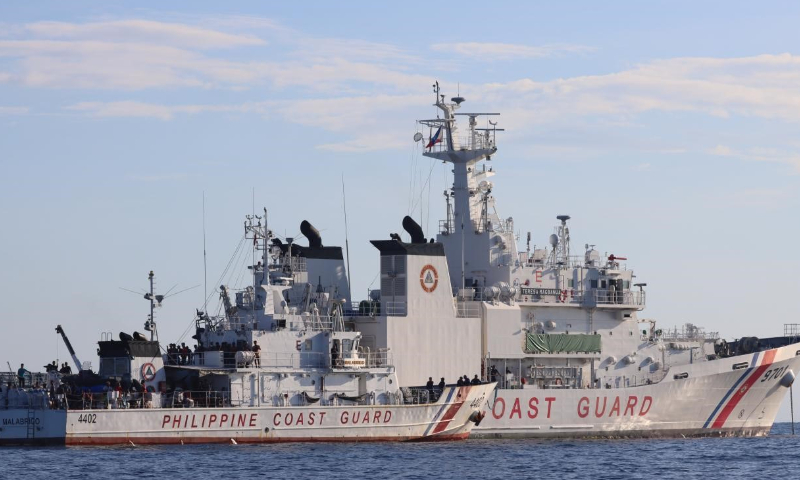
The photo taken on May 6, 2024 shows the Philippine ships 4402 and 9701 are transferring supplies in the waters of China's Xianbin Jiao. Photo: China Coast Guard
Since April of this year, the vessel has entered the waters of China's Xianbin Jiao and has been continuously active there. Philippine Coast Guard spokesperson Jay Tarriela previously said at a press conference that the Coast Guard's actions were intended to prevent China from successfully reclaiming land on Xianbin Jiao. However, recent footage obtained by the Global Times showed that the Philippines has been frequently and continuously delivering supplies, including building materials, to the BRP Teresa Magbanua. This move indicates an intent to change the status quo of Xianbin Jiao and escalate the infringement activities in the South China Sea.
The footage showed that since May, the Philippine Coast Guard has deployed ships 4402, 4404, and 4409 in rotation to deliver supplies to the BRP Teresa Magbanua.
Supplies including fresh water, fuel, and food, as well as rotating personnel, were delivered to the BRP Teresa Magbanua on May 3 to 9, May 14, and May 23 to June 3.
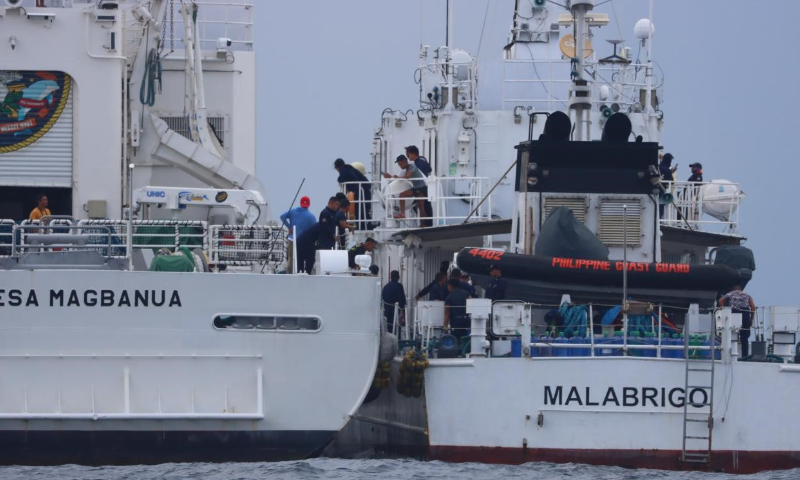
The photo taken on May 9 shows the Philippine ships 4402 and 9701 are transferring personnel and supplies in the waters of China's Xianbin Jiao. Photo: China Coast Guard
In a recent interview with the Global Times, Yang Xiao, deputy director of the Institute of Maritime Strategy Studies under the China Institute of Contemporary International Relations, said that the "BRP Teresa Magbanua" is one of the most advanced ships of the Philippine Coast Guard.
Due to the large number of crew members it carries on a daily basis, there is significant consumption of living supplies. The frequent deployment of various types of ships by the Philippines to supply the "BRP Teresa Magbanua" and rotate personnel underscores the Philippines' intention to maintain a long-term presence at Xianbin Jiao, achieving a quasi-permanent military presence.
This intention is also "hidden" in some of the details of their illegal resupply operations. Upon closely examining related footage, the Global Times found that during the resupply operations, the Philippines frequently transported mysterious box-shaped items to the "BRP Teresa Magbanua."
In one illegal resupply operation on May 23, the "BRP Teresa Magbanua" hoisted large bags marked "MABUHAY PORTLAND" from the Philippine Coast Guard's 4409 ship. A person working in the construction materials industry in the Philippines told the Global Times that "MABUHAY PORTLAND" is a construction materials brand in the Philippine market, which primarily produces cement.
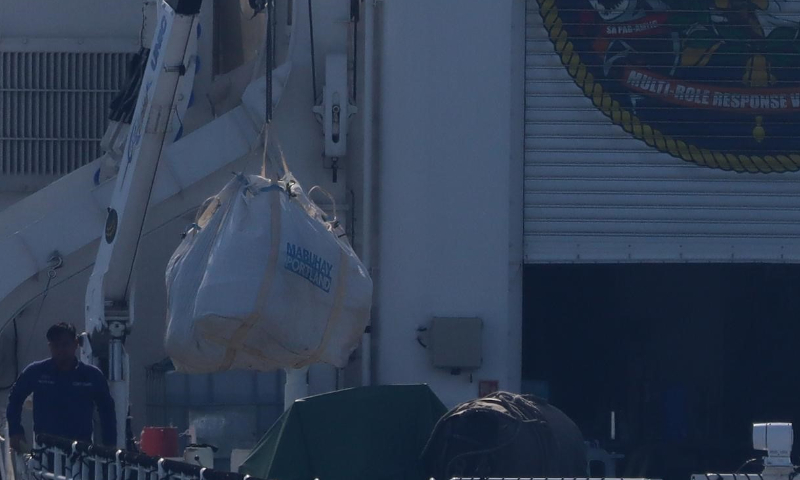
The photo taken on May 23 shows the Philippine Coast Guard's 4409 ship and 9701 ship transferred suspected cement construction materials in the waters of China's Xianbin Jiao. Photo: China Coast Guard
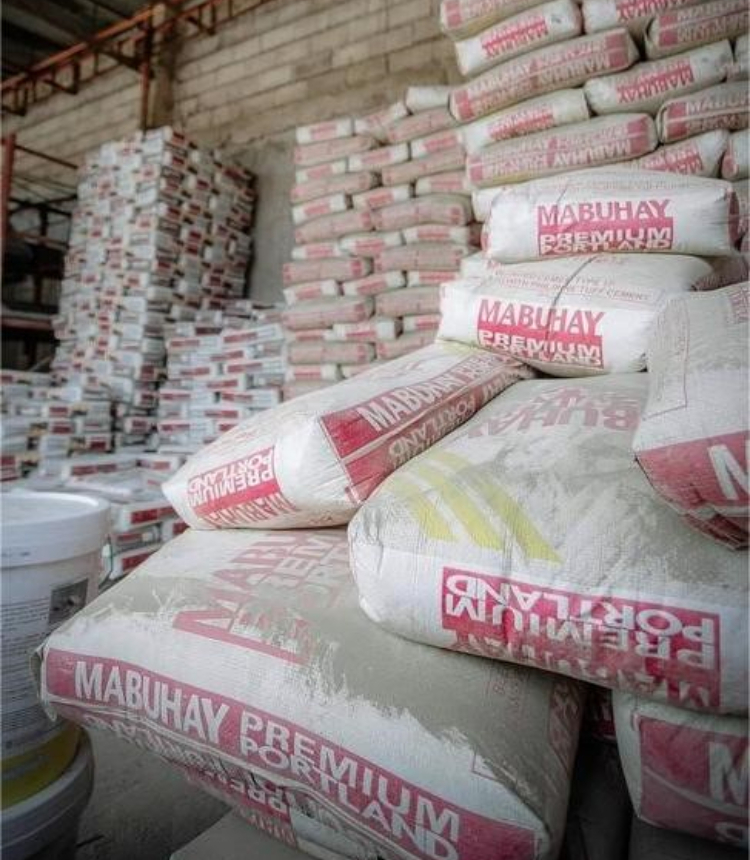
"MABUHAY PORTLAND" is a construction materials brand in the Philippine market, with cement as its main product. Photo credit: Internet
Yang said that the various actions by the Philippines indicate their intention to replicate the illegal grounding of a warship at Ren'ai Jiao in the South China Sea in 1999. the Philippine vessel 9701 has now become a maritime platform that operates for the long term around Xianbin Jiao. Transporting a large amount of supplies and even suspected construction materials suggests that the Philippines intends to eventually establish a permanent facility on Xianbin Jiao.
The Philippines' actions have strategic intentions. Currently, conducting activities from within the country to Ren'ai Jiao and other illegally occupied reefs involves a considerable distance.
"Xianbin Jiao, located between Renai Jiao and the Philippines' Palawan Island, is closer to the Philippine mainland. The Philippines intends to develop Xianbin Jiao into a maritime "base" for illegally supplying Renai Jiao and a "foothold" for conducting infringement activities in the South China Sea," Yang said.
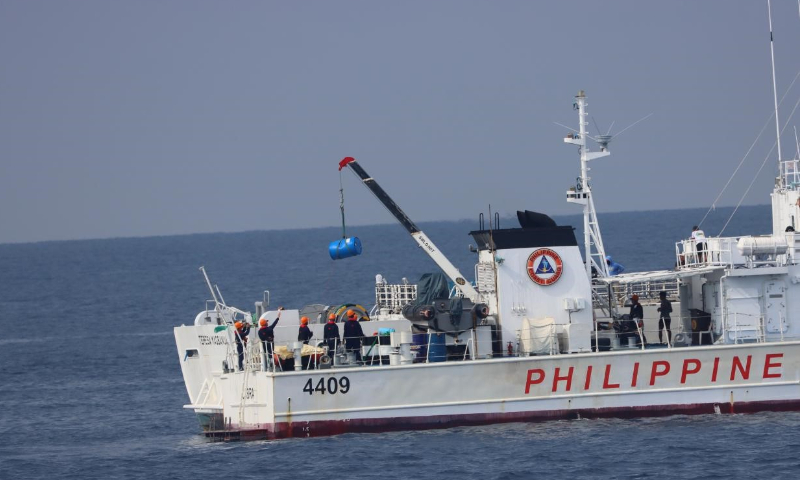
The photo taken on May 14 shows the Philippine Coast Guard's 4409 ship and 9701 ship transferred a blue oil barrel in the waters of China's Xianbin Jiao. Photo: China Coast Guard
The Philippines illegally grounded a warship at Ren'ai Jiao more than 20 years ago, and to this day, they are still trying to "replicate" this tactic. Yang said the Philippines fails to realize that this opportunistic idea has no feasibility at all. "Even though they illegally grounded a warship at Ren'ai Jiao, we thwarted their attempts to build permanent facilities. Now, at Xianbin Jiao, the Philippines is even less likely to succeed," Yang said.
China currently has absolute control over both Ren'ai Jiao and Xianbin Jiao. Not only are there Chinese Navy ships conduct patrols in the waters, but the China Coast Guard also conducts regular law enforcement to safeguard rights in this region, Yang said.
Additionally, Chinese fishermen operating in these waters will voluntarily stand up to prevent any infringement by the Philippines. Therefore, any schemes by the Philippines are utterly impossible to achieve.
Furthermore, the surrounding countries in the South China Sea will no longer tolerate the Philippines' blatant attempts to alter the status quo in the South China Sea, especially actions such as grounding on uninhabited islands and building permanent facilities, Yang said.
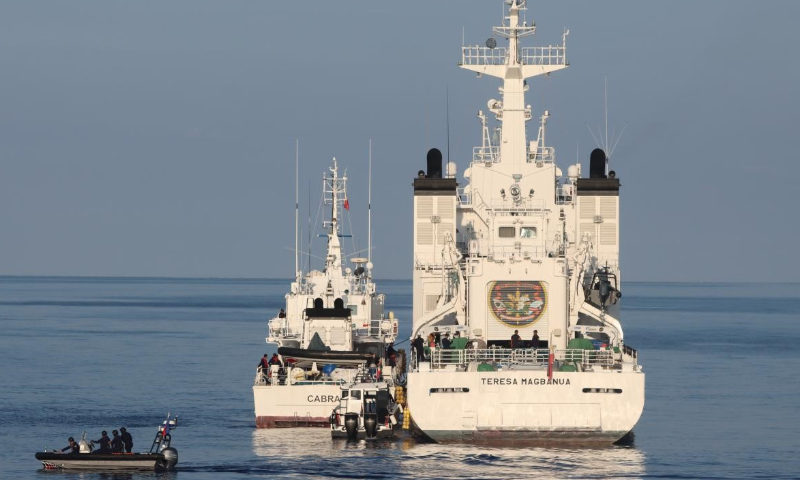
The photo taken on May 23 shows the Philippine Coast Guard's 4409 ship and 9701 ship transferred personnel and supplies in the waters of China's Xianbin Jiao. Photo: China Coast Guard
The Global Times learned that China currently maintains an absolute advantage in the sea waters of Xianbin Jiao with the presence of maritime law enforcement forces. Additionally, Xianbin Jiao is a traditional fishing ground for Chinese fishermen, many of whom have long been conducting fishing operations there. Footage shows that during the Philippines' illegal resupply operation on May 23, a Chinese fishing boat even approached closely, standing firm against the infringement actions of the Philippine Coast Guard.
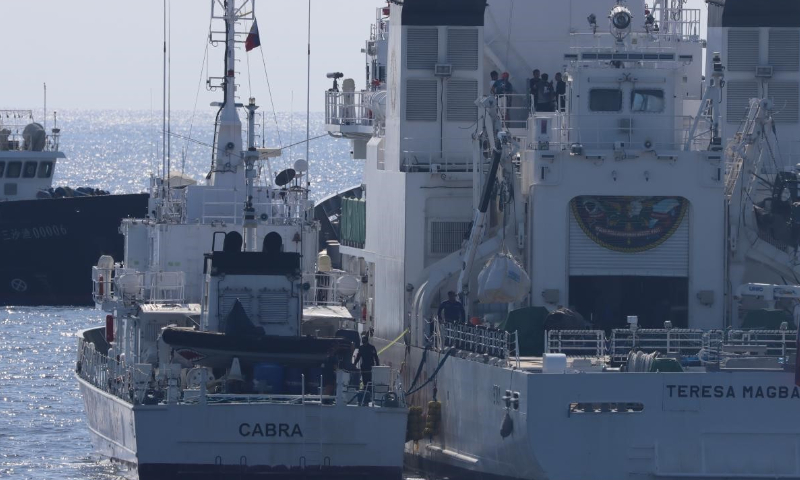
The photo taken on May 23 shows that in the face of Philippine infringements, a Chinese fishing boat even approached closely, standing firm and refusing to yield. Photo: China Coast Guard
Yang said that the Philippines may not yet realize that their actions at Xianbin Jiao are a strategic blunder. As a countermeasure, China will undoubtedly increase its maritime law enforcement presence at Xianbin Jiao, potentially making it a permanent regular presence. "Xianbin Jiao is closer to the Philippine mainland, and the forward deployment of China's maritime law enforcement forces will further reduce the space for the Philippines to carry out infringements in the South China Sea," Yang said.











